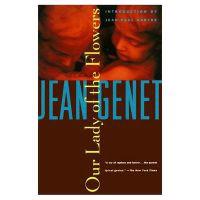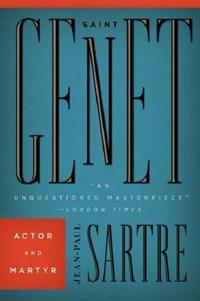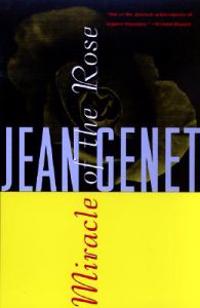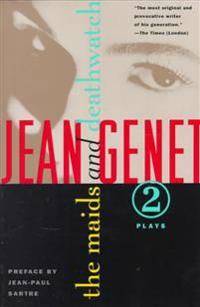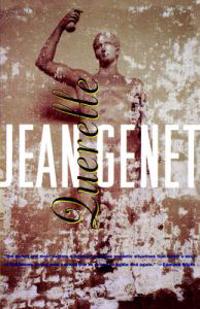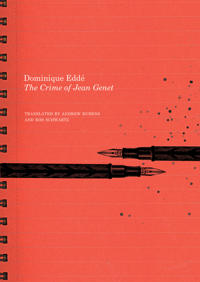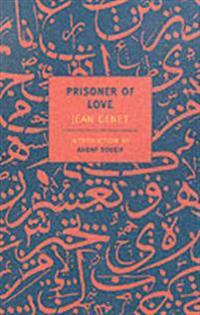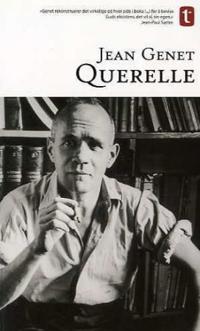Our Lady of the Flowers (Pocket)
avJean Genet, Jean-Paul Sartre, Jean Genet
ISBN: 9780802130136 - UTGIVEN: 198808Jean Genet's first, and arguably greatest, novel was written while he was in prison. As Sartre recounts in his introduction, Genet penned this work on the brown paper which inmates were supposed to use to fold bags as a form of occupational therapy. The masterpiece he managed to produce under those [...]
Selected Writings of Jean Genet (HÃĊftad)
avJean Genet, Edmund White, Edmund White
ISBN: 9780880014205 - UTGIVEN: 199505Excerpts from the novels, plays, and poems of the French convict, prostitute, and literary artist join notes from his film, The Penal Colony, letters, essays, and a rare interview, all edited by a contemporary biographer.[...]
Funeral Rites (Pocket)
avJean Genet, Bernard Frechtman, Jean Genet
ISBN: 9780802130877 - UTGIVEN: 197206Genet's sensual and brutal portrait of World War II unfolds between the poles of his grief for his lover Jean, killed in the Resistance during the liberation of Paris, and his perverse attraction to the collaborator Riton. Elegaic, macabre, chimerical, Funeral Rites is a dark meditation on the mirro[...]
Miracle of the Rose (Pocket)
avJean Genet, Bernard Frechtman, Jean Genet
ISBN: 9780802130884 - UTGIVEN: 197206This nightmarish account of prison life during the German occupation of France is dominated by the figure of the condemned murderer Harcamone, who takes root and bears unearthly blooms in the ecstatic and brooding imagination of his fellow prisoner Genet.[...]
Balcony (HÃĊftad)
avJean Genet
ISBN: 9780571250301 - UTGIVEN: 200903In a brothel of an unnamed French city the madam, Irma, directs a series of fantastical scenarios. The patrons of the brothel wait anxiously for the chief of police to arrive, but in his place comes the queen's envoy to inform that the figureheads of the establishment have been killed in the uprisin[...]
Thief's Journal (HÃĊftad)
avJean Genet
ISBN: 9780571250332 - UTGIVEN: 2009-03Encompassing vagrancy, petty theft, and prostitution, this book transforms such degradations into the gilded rites of an inverted moral code, with the author as its most devout adherent.[...]
Miracle of the Rose (HÃĊftad)
avJean Genet
ISBN: 9780571250387 - UTGIVEN: 2009-03Composed in 1943 while the author was incarcerated in La Sante prison, this title features Harcamone, whom the author first encountered at Mettray and who resurfaces, unsurprisingly, in the adult prison of Fontevrault - now a murderer, and, in the world-turned-upside-down of the author's vision, a q[...]
Our Lady of the Flowers (HÃĊftad)
avJean Genet
ISBN: 9780571251155 - UTGIVEN: 2009-04Features a 16-year-old hoodlum who has fulfilled his destiny by strangling an old man. In the world of Our Lady - a world of pimps, thieves, prostitutes, queens and blackmailers - 'morality' in the common sense of the word has no meaning.[...]
Blacks (HÃĊftad)
avJean Genet
ISBN: 9780571251520 - UTGIVEN: 2009-05What exactly is a black? First of all, what's his colour?' Stereotyping, masking and clowning would be the tools with which the author dissected settled ideas of race and identity in this book.[...]
Funeral Rites (HÃĊftad)
avJean Genet
ISBN: 9780571251544 - UTGIVEN: 2009-05Offers a meditation on the mirror images of love and hate, sex and death.
Querelle of Brest (HÃĊftad)
avJean Genet
ISBN: 9780571256211 - UTGIVEN: 201002Querelle, a young sailor is at large in the port of Brest. His abrupt superior officer, Lt Seblon, records in an elegant diary his longing for the young man. The policeman, who frames his mates for stealing from the Monoprix, covets him. Mario, the brothel keeper's husband, feels entitled to possess[...]
The Maids / Deathwatch (HÃĊftad)
avJean Genet
ISBN: 9780802150561 - UTGIVEN: 199402The two plays collected in this volume represent Genet's first attempts to analyze the mores of a bourgeois society he had previously been content simply to vilify. In The Maids, two domestic workers, deeply resentful of their inferior social position, try to revenge themselves against society by de[...]
Querelle (Pocket)
avJean Genet
ISBN: 9780802151575 - UTGIVEN: 1989-07Regarded by many critics as Jean Genet's highest achievement in the novel -- certainly one of the landmarks of postwar French literature. The story of a dangerous man seduced by peril, Querelle deals in a startling way with the Dostoyevskian theme of murder as an act of total liberation."[...]
The Crime of Jean Genet
ISBN: 9780857423399 - UTGIVEN: 2016-05Dominique Edde met novelist and playwright Jean Genet in the 1970s. And she never forgot him. His presence, she writes, gave me the sensation of icy fire. Like his words, his gestures were full, calculated and precise. . . . Genet s movements mimicked the movement of time, accumulating rather than p[...]
Soledad Brother: The Prison Letters of George Jackson (HÃĊftad)
avGeorge Jackson, Jean Genet, Jonathan Jackson
ISBN: 9781556522307 - UTGIVEN: 1994-09"The power of George Jackson's personal story remains painfully relevant to our nation today, with its persistent racism, its hellish prisons, its unjust judicial system, and the poles of wealth and poverty that are at the root of all that. I hope the younger generation, black and white, will read "[...]
Our Lady of the Flowers (HÃĊftad)
avJean Genet
ISBN: 9781596541368 - UTGIVEN: 200412Jean Genet's seminal Our Lady Of The Flowers (1943) is generally considered to be his finest fictional work. The first draft was written while Genet was incarcerated in a French prison; when the manuscript was discovered and destroyed by officials, Genet, still a prisoner, immediately set about writ[...]
The Thief's Journal (HÃĊftad)
avJean Genet
ISBN: 9781596541375 - UTGIVEN: 200412Genet's fictionalized and distant account of his rambles through France, Czechoslavakia, Germany and elsewhere in the '30s and '40s, covering his time in prison, his relationships with men such as the one-armed Stilitano, along with erotic accounts of his lovers during the period, and interspersed w[...]
Jean Genet (HÃĊftad)
avStephen Barber
ISBN: 9781861891785 - UTGIVEN: 200411This title includes an introduction by Edmund White. This new short biography and critical work cuts directly to the essence of Genet's life, a life of extraordinary spectacle that was always profoundly entangled with his work. Stephen Barber emphasises those elements that made his life particularly[...]
Querelle (Pocket)
avJean Genet
ISBN: 9788205340602 - UTGIVEN: 2005SjÃẁmannen Georges Querelle er bÃċde voldelig og kriminell. I Brest mÃẁter han broren Robert, som holder til i havnebyens horehus. I Brest befinner seg ogsÃċ Querelles overordnede, lÃẁytnant Seblon, den homofile offiseren som deler sine lyster med dagboka si. Da to drap finner sted i byen, lykkes Qu[...]
Matrosen & stjÃĊrnan (e-bok)
avJean Genet
ISBN: 9789174993349 - UTGIVEN: 2013-08Querelle landstiger i Brest, vars dimmiga hamnkvarter befolkas av sjömÃĊn, hamnarbetare, poliser och prostituerade.
Querelle, sjÃĊlv matros, tjuv, opiumsmugglare, prostituerad och seriemördare, begÃċr ett mord som för honom innebÃĊr bÃċde en förbannelse och en befrielse; det utplÃċnar honom s[...]Rosenmiraklet (e-bok)
avJean Genet
ISBN: 9789174993400I Rosenmiraklet [1946] Ãċterger Jean Genet sina erfarenheter inifrÃċn franska fÃĊngelser pÃċ tjugo-, trettio- och fyrtiotalen. Det blir mer en vÃĊrldsförklaring ÃĊn en bekÃĊnnelse. Den katolska moraliska ordning som Genet inprÃĊntats sedan barnsben Ãċterkastas i en inverterad version, dÃĊr en mörd[...]
Tjuven och kÃĊrleken (Inbunden)
avJean Genet, Martina Lowden
ISBN: 9789174996098 - UTGIVEN: 2014-11-08Jean Genets oerhört inflytelserika första roman Tjuven och kÃĊrleken skrevs i fÃĊngelse 1942, pÃċ den bruna papp fÃċngen Genet förvÃĊntades göra pÃċsar av.
HjÃĊlten ÃĊr transan Divine, som introduceras med sin död och begravning. Innan hon dog av lungsot levde hon i en vindskupa med utsikt Ã[...]

